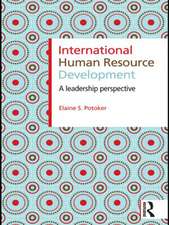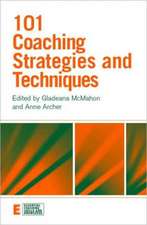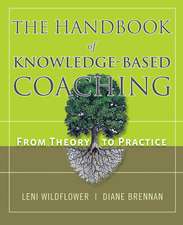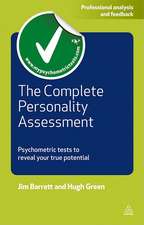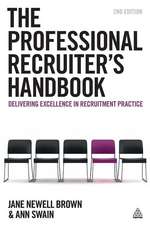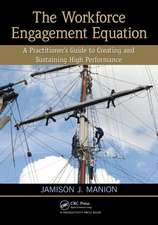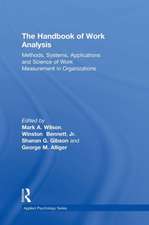Managing Human Resources in Asia-Pacific: Second edition: Global HRM
Editat de Arup Varma, Pawan S. Budhwaren Limba Engleză Paperback – 25 iul 2013
| Toate formatele și edițiile | Preț | Express |
|---|---|---|
| Paperback (1) | 413.08 lei 6-8 săpt. | |
| Taylor & Francis – 25 iul 2013 | 413.08 lei 6-8 săpt. | |
| Hardback (1) | 767.93 lei 6-8 săpt. | |
| Taylor & Francis – 25 iul 2013 | 767.93 lei 6-8 săpt. |
Din seria Global HRM
- 8%
 Preț: 386.00 lei
Preț: 386.00 lei - 8%
 Preț: 406.14 lei
Preț: 406.14 lei - 8%
 Preț: 404.37 lei
Preț: 404.37 lei - 8%
 Preț: 548.93 lei
Preț: 548.93 lei - 8%
 Preț: 421.46 lei
Preț: 421.46 lei - 8%
 Preț: 385.97 lei
Preț: 385.97 lei -
 Preț: 357.59 lei
Preț: 357.59 lei - 22%
 Preț: 356.34 lei
Preț: 356.34 lei - 15%
 Preț: 466.45 lei
Preț: 466.45 lei - 30%
 Preț: 332.02 lei
Preț: 332.02 lei -
 Preț: 356.88 lei
Preț: 356.88 lei - 15%
 Preț: 465.94 lei
Preț: 465.94 lei - 15%
 Preț: 472.32 lei
Preț: 472.32 lei -
 Preț: 355.31 lei
Preț: 355.31 lei - 22%
 Preț: 339.31 lei
Preț: 339.31 lei - 23%
 Preț: 427.41 lei
Preț: 427.41 lei -
 Preț: 235.75 lei
Preț: 235.75 lei -
 Preț: 447.58 lei
Preț: 447.58 lei - 22%
 Preț: 328.19 lei
Preț: 328.19 lei - 26%
 Preț: 991.00 lei
Preț: 991.00 lei - 26%
 Preț: 1046.65 lei
Preț: 1046.65 lei -
 Preț: 485.61 lei
Preț: 485.61 lei -
 Preț: 448.44 lei
Preț: 448.44 lei - 31%
 Preț: 323.72 lei
Preț: 323.72 lei
Preț: 413.08 lei
Preț vechi: 531.41 lei
-22% Nou
Puncte Express: 620
Preț estimativ în valută:
79.06€ • 82.23$ • 66.26£
79.06€ • 82.23$ • 66.26£
Carte tipărită la comandă
Livrare economică 13-27 martie
Preluare comenzi: 021 569.72.76
Specificații
ISBN-13: 9780415898652
ISBN-10: 041589865X
Pagini: 320
Ilustrații: 20 black & white tables, 9 black & white line drawings
Dimensiuni: 174 x 246 x 18 mm
Greutate: 0.59 kg
Ediția:Revizuită
Editura: Taylor & Francis
Colecția Routledge
Seria Global HRM
Locul publicării:Oxford, United Kingdom
ISBN-10: 041589865X
Pagini: 320
Ilustrații: 20 black & white tables, 9 black & white line drawings
Dimensiuni: 174 x 246 x 18 mm
Greutate: 0.59 kg
Ediția:Revizuită
Editura: Taylor & Francis
Colecția Routledge
Seria Global HRM
Locul publicării:Oxford, United Kingdom
Cuprins
@Selected Contents: 1. Managing Human Resources in Asia-Pacific: An Introduction Pawan S Budhwar and Arup Varma 2. Human Resource Management in China Fang Lee Cooke 3. Human Resource Management in South Korea Chris Rowley and Johngseok Bae 4. Human Resource Management in Japan Philippe DeBroux 5. Human Resource Management in Hong Kong Andrew Chan and Derek Man 6. Human Resource Management in Taiwan Wan-Jing April Chang 7. Human Resource Management in India Debi S Saini and Pawan S Budhwar 8. Human Resource Management in Thailand Sununta Siengthai 9. Human Resource Management in Vietnam Anne Cox 10. Human Resource Management in Malaysia Marlin Abdul Malek, Arup Varma and Pawan S Budhwar 11. Human Resource Management in Singapore Klaus Templer, David Wan and Naresh Khatri 12. Human Resource Management in Australia Marilyn Clark and Margaret Patrickson 13. Human Resource Management in Fiji Suwastika Naidu, RD Pathak and Anand Chand 14. Human Resource Management in New Zealand Ann Hutchison and Noelle Donnelly 15. HRM Challenges in the Asia-Pacific: Agenda for Future Research and Policy Arup Varma and Pawan S Budhwar
Notă biografică
Arup Varma is Professor of Human Resource Management at Loyola University Chicago's Quinlan School of Business. From 2002-2007 Arup was Director of the HRER Institute and Chair of the HRM department at the School of Business Administration. Varma earned his Ph.D. from Rutgers University, an M.S. in Personnel Management & Industrial Relations (with honors) from XLRI Jamshedpur (India) and a B.S. in Economics(with honors) from St. Xavier's College, Calcutta, India. Dr.Varma's research interests include performance appraisal, expatriate issues, and HRM in India. He has published over 40 articles in leading journals including Academy of Management Journal, Personnel Psychology, Journal of Applied Psychology, Human Resource Management Review and the Journal of World Business. He is also co-founder and President-elect of the Indian Academy of Management.
Pawan Budhwar is a Professor of International HRM and Associate Dean Research at Aston Business School, UK. He is a Co-Founder and first President of the Indian Academy of Management. Budhwar has published over 75 articles in a number of leading journals on International HRM/OB related topics with a specific focus on India. He has also written and/or co-edited 9 books on HRM related topics on: Asia-Pacific, Middle East, Performance Management, India, Developing Countries, Research Methods, Major Works in International HRM and Doing Business in India. He is on the editorial board of over ten journals and is an Associate Editor of Human Resource Management. Budhwar is also an advisor to the Commonwealth Commission for scholarships and fellowships, a Fellow of the Higher Education Academy and the British Academy of Management and an Academician of the Academy of Social Sciences. He is also a Chartered Member of the Chartered Institute of Personnel and Development.
Pawan Budhwar is a Professor of International HRM and Associate Dean Research at Aston Business School, UK. He is a Co-Founder and first President of the Indian Academy of Management. Budhwar has published over 75 articles in a number of leading journals on International HRM/OB related topics with a specific focus on India. He has also written and/or co-edited 9 books on HRM related topics on: Asia-Pacific, Middle East, Performance Management, India, Developing Countries, Research Methods, Major Works in International HRM and Doing Business in India. He is on the editorial board of over ten journals and is an Associate Editor of Human Resource Management. Budhwar is also an advisor to the Commonwealth Commission for scholarships and fellowships, a Fellow of the Higher Education Academy and the British Academy of Management and an Academician of the Academy of Social Sciences. He is also a Chartered Member of the Chartered Institute of Personnel and Development.
Recenzii
"Managing Human Resources in Asia-Pacific (2nd Edition) edited by Arup Varma and Pawan Budhwar is an outstanding resource for all researchers, practitioners, and students focusing on human resource management in the Asia-Pacific region. Readers of this volume will learn the differences (and similarities) across HR systems in thirteen of the most critical countries in this high-growth and strategically important region of the world. Professors Varma and Budhwar have assembled leading experts who provide valuable insights on the most significant issues affecting talent management in their respective countries. Whether new to global HRM or a seasoned global HR professional, this book is an essential and informative resource to help us better understand human resource issues in the Asia-Pacific region."
Professor Paula Caligiuri, Rutgers University and Author of Cultural Agility: Building a Pipeline of Successful Global Professionals
"The new edition of Managing Human Resources in Asia-Pacific is a useful introduction to the subject for both students and teachers, as well as interested practitioners. It offers many fascinating insights into the emergence and evolution of HRM across this region, now becoming the power-house of the global economy. It is a well thought-out comparative study, which covers a wide range of countries, thirteen in all, and their respective HR systems, in order to help us better understand their past, present and future. Each chapter conforms to a common analytical framework set out by the Editors and contributes to an insightful set of conclusions. This excellent edited book will no doubt become a standard work in the field for many years to come."Professor Malcolm Warner, Emeritus Fellow, Wolfson College and Judge Business School, University of Cambridge
"Since the excellent first edition of this book was published in 2004, the economic focus of the world has started to move away from the US and Western Europe and towards Asia and the Pacific. The present text, then, is all the more important, as it explores the issues and challenges involved in managing human resources in those areas. With chapters written either by natives or long-time scholars of a country, and structured to help readers compare and contrast HRM practices across the region (but not to find a one-size-fits-all model), this book celebrates the differences in culture, political systems, and economic systems that help determine the HRM practices in each country. It will be incredibly useful to anyone contemplating a career that involves managing people in this part of the world."
Angelo DeNisi, Professor, Tulane University
Professor Paula Caligiuri, Rutgers University and Author of Cultural Agility: Building a Pipeline of Successful Global Professionals
"The new edition of Managing Human Resources in Asia-Pacific is a useful introduction to the subject for both students and teachers, as well as interested practitioners. It offers many fascinating insights into the emergence and evolution of HRM across this region, now becoming the power-house of the global economy. It is a well thought-out comparative study, which covers a wide range of countries, thirteen in all, and their respective HR systems, in order to help us better understand their past, present and future. Each chapter conforms to a common analytical framework set out by the Editors and contributes to an insightful set of conclusions. This excellent edited book will no doubt become a standard work in the field for many years to come."Professor Malcolm Warner, Emeritus Fellow, Wolfson College and Judge Business School, University of Cambridge
"Since the excellent first edition of this book was published in 2004, the economic focus of the world has started to move away from the US and Western Europe and towards Asia and the Pacific. The present text, then, is all the more important, as it explores the issues and challenges involved in managing human resources in those areas. With chapters written either by natives or long-time scholars of a country, and structured to help readers compare and contrast HRM practices across the region (but not to find a one-size-fits-all model), this book celebrates the differences in culture, political systems, and economic systems that help determine the HRM practices in each country. It will be incredibly useful to anyone contemplating a career that involves managing people in this part of the world."
Angelo DeNisi, Professor, Tulane University
Descriere
The latest instalment in the Global HRM series, Managing Human Resources in Asia-Pacific (2E) presents the HRM situations in a number of South-East Asian and Pacific Rim countries, highlighting the growth of the personnel and HR function, the dominant HRM system(s) in the area, the influence of different factors on HRM, and the challenges faced by HR functions in these nations. This edition will extend its coverage to Cambodia, Fiji, Indonesia, and the Philippines; a new chapter will also discuss HR research challenges in the region, such as the transferability of western constructs, problems with data collection, and the emergence of MNEs from Asia Pacific.



